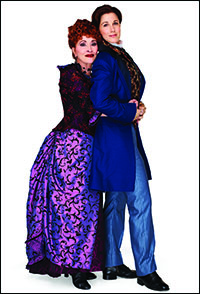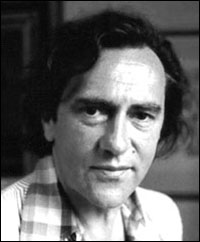
*
Only once did Charles Dickens let the reader down. On June 8, 1870, the 58-year-old writer put in a full day's work on "The Mystery of Edwin Drood," suffered a stroke and had the temerity to die the next day, taking the identity of who did it to his grave.
Since then, there has been a lot of conjecture, elementary deductions and downright grave-robbing by people trying to resolve this cold case. Solutions have been paraded in print, on radio, in film, on TV and in a stage musical.
The show that Rupert Holmes has mischievously advanced in the latter medium (now getting a Broadway revival by Roundabout Theatre Company) may well be the most even-handed of the lot: He leaves the unmasking to the audience. Four or five songs into Act Two — right in the middle of the aptly titled and quite literal showstopper "Don't Quit While You're Ahead" — the action comes to a complete halt, and an announcement is gravely made: "Ladies and gentlemen, it was at this point in our story that Mr. Charles Dickens laid down his pen forever."
The audience then sifts through the evidence and picks the killer of the title character (played by Stephanie J. Block in drag). Was it his fiancée, Rosa Bud (Betsy Wolfe)? Others who lusted after her: swain Neville Landless (Andy Karl) or choirmaster John Jasper (Will Chase)? Landless' twin sister, Helena (Jessie Mueller)? Opium den proprietress, Princess Puffer (Chita Rivera)? The mayor (Jim Norton)? The reverend (Gregg Edelman)? You decide.
 |
||
| Chita Rivera and Stephanie J. Block |
||
| photo by Andrew Eccles |
That year, he was doing an act of comedy and music at Dangerfield's and, one night, got a note backstage from Gail Merrifield Papp saying, "Have you ever thought of writing a musical? If so, we should talk." The next day, he was in her office talking about Drood.
"When she asked how we would conclude it, I said the most theatrical concept would be for the audience to decide from a variety of endings. We walked into Joe Papp's office, told him the same thing, and he encouraged me to write it."
 |
||
| Joe Papp |
The Mystery of Edwin Drood premiered at Central Park's Delacorte Theater in '85 and went to Broadway that November mostly intact. Its curtain-raiser, "An English Music Hall," didn't make that run but Holmes said earlier this fall that he hopes to reinstate it in this revival at the top of Act Two.
"I liked it because it defined what an English music hall is, and it'll be helpful since we're transforming Studio 54 into the Music Hall Royale," he says. "We want you to feel, as soon as you walk in the doors, you're in that music hall. Also, I've updated a couple of the murderers' confessions, and some of the lovers' exchanges have changed as well.
"There are eight candidates for murderer, five candidates for the detective-in-disguise and 36 combinations of lovers. If you combine all the different components, all the different lines that everyone has to memorize, there are over 400 permutations of endings — some combinations of which I have never seen. That does not mean I sat down and wrote 400 endings, but there are 400 combinations of different characters being different things. Each actor has to be responsible for what he would do if voted a detective-in-disguise or a murderer or a lover. The women have to know what they will say to nine or ten potential lovers so that it all makes sense. To be a swing on this show is to earn the Congressional Medal of Honor.
"It was complicated to work out. Working every day, it took me three years to write this musical. It was a joy to write it, but it took a lot of thinking and a lot of planning and a lot of diagrams — sorta schematic diagrams: 'If she is this, then they must exit there.' 'She would then have to say that.' 'This character would have to enter here.'" Pehaps the Rubik's cube should have been called the Rupert's cube?
(This feature appears in the November 2012 issue of Playbill magazine.)
























